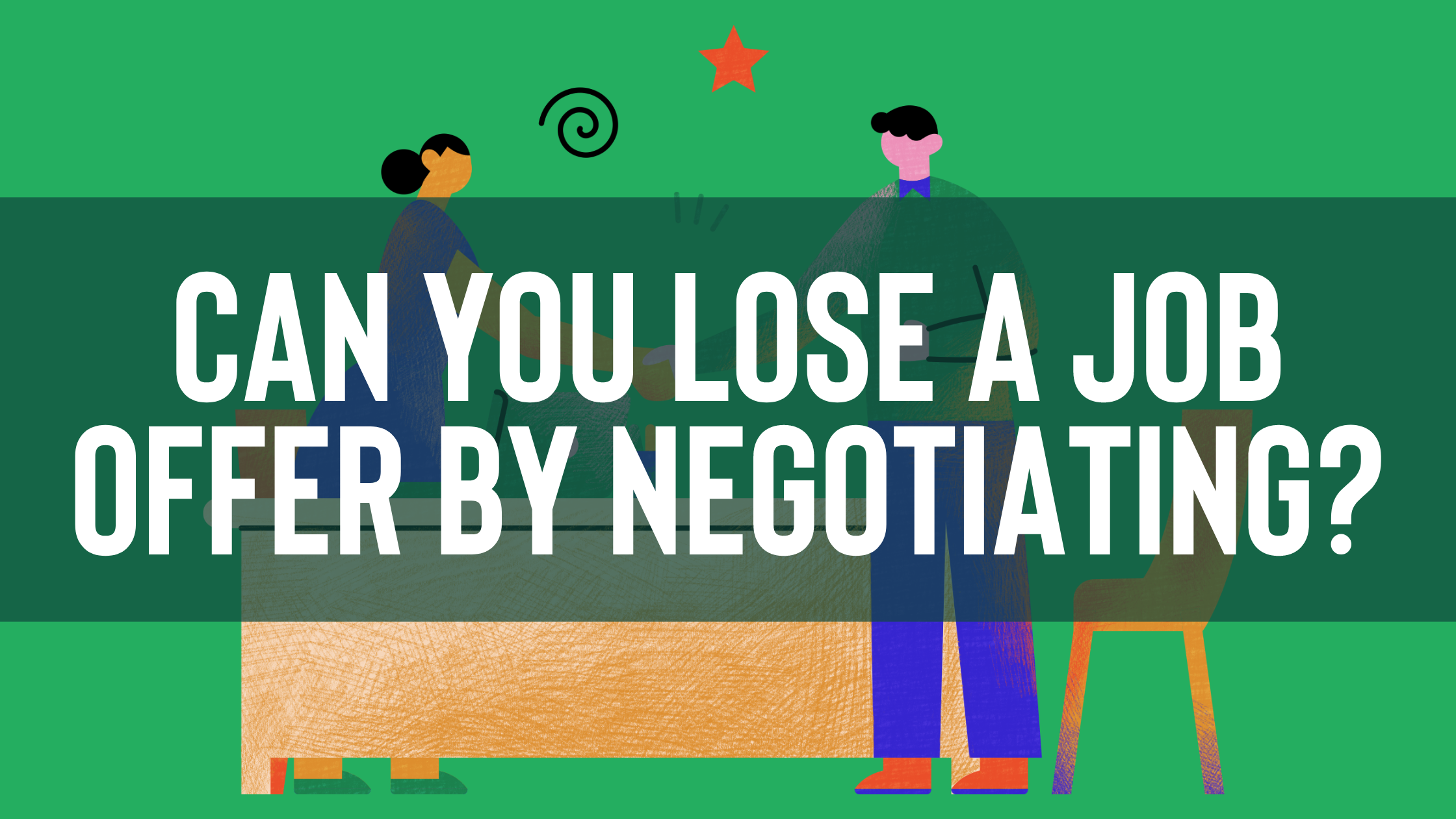

Navigating the art of salary negotiation can be a difficult task, especially when you’re scared that you could lose a job offer because of it. Don’t let that fear get the best of you.
Worrying about all the bad things that could happen will only add insecurity to your efforts. Have you thought about what good things might happen? Because there’s a higher chance of a good outcome from negotiating rather than a bad one like a rescinded job offer.
There are people that work some of the highest-paying jobs without a college degree. They're not only in the corporate world either. There are just as many high-paying trade jobs out there too. One reason they increased their pay is by negotiating their salary.
Always negotiate your salary and benefits no matter what doubts may pop in your head. How you go about that is the secret sauce to getting what you want.
Key points:
- Job offers aren’t normally rescinded due to negotiating.
- There are ways to avoid losing a job offer, but some things may be out of your control.
- Don’t let fear stop you from negotiating and advocating for yourself. Always negotiate no matter what.
Can You Lose a Job Offer By Negotiating Salary?
Can you really lose a job offer by negotiating salary? Well, yes and no. It’s actually a rare occurrence because employers expect people to negotiate when receiving a job offer. But it still happens as not all employers are the same.
?
For instance, The Cut published a letter from a woman who lost a job offer after negotiating, but most likely due to something that happened on the employer’s end. They almost didn’t publish the letter in fear that it would deter other women from negotiating, but thought it was important to share since the topic isn’t something that is talked about often.
However, a survey from Fidelity found 85% of Americans and 87% of professionals ages 25 to 35 were successful when negotiating salary and benefits, meaning they got at least close to what they negotiated for. Remember, those odds are in your favor. If you let the fear of negotiating overcome you, you could lose out on some serious wealth building money in the future.
Why Do Employers Rescind Job Offers?
Usually it has little to do with you and everything to do with the employer. Pulling offers when a candidate negotiates is outside of normal business operations and could indicate that they lack a professional culture in their hiring process. If that’s the case, you probably don’t want to be working for them anyway.
?
On the other hand, there may be things happening on the employer side that fairly explains why they rescinded the offer, but they rarely reveal those details. They could’ve found a stronger candidate last minute, changed organizational needs, or received pressure to hire an internal candidate from higher up management.
When negotiating salary and benefits, there will always be things outside your control. Instead, focus on what you can control.
The Do’s & Don’ts of Salary Negotiation
There are several reasons why a job offer might be rescinded. When you can’t control much from what happens behind the scenes of the employer, you can at least control your end of the negotiation.
Let’s dig into a few do’s and don’ts of salary negotiation so you can step into the discussion fully prepared.
Don’t Make Unrealistic Demands When Negotiating
When negotiating your compensation package or asking for a raise, avoid responding with excessive counteroffers or demands that are unrealistic. These could be demands that are against company policy, rebounding with a new ask each time they respond, and anyway that shows you are unwilling to meet an agreement.
Do Provide Proof of Your Value
Make sure you have a justifiable reason that has to do with your value as a candidate when negotiating. For example, when negotiating for a higher salary but using personal preference instead of presenting it as your market salary could appear as a red flag to the employer. Our Free Negotiation Guide is a great resource to assist you in how to present your value to the company.
?
Don’t Be Combative or Aggressive
This goes hand-in-hand with unrealistic demands, which could be seen as combative and an indication that you may be difficult to work with. If you act unprofessionally or aggressive during the negotiation, including passive aggressively, that could be another reason a job offer would be withdrawn.
Do Make Sure to Be a Good Communicator During The Hiring Process
When receiving a job offer, make sure to stay in constant contact with the recruiter and hiring manager in the most professional way possible. This includes when negotiating over the phone and email. Don’t leave them hanging for days without prompt communication of how long to expect when they’ll hear from you next. You want to show them that you are a good communicator and are reachable. This will also show them how you’ll perform in the new role and that you’re easy to work with when coming to an agreement.
?
Don’t Beat Around The Bush
Talking about pay and benefits earlier in the interview process will help set expectations and prevent excessive negotiations after a job offer. If you were to ask about the salary in the first few interviews, that is an expected question to bring up and sets the stage for when negotiations come around during a job offer. Due to several pay transparency laws across the country, it’s illegal in some states for them to refuse that question.
Do Work On Your Timing
Trying to negotiate after accepting a job offer or after a round of negotiations when terms were already agreed on could be a red flag as well, but isn’t always. If you decide to negotiate after accepting the job offer, we have a few salary negotiation scripts to help you with handling that situation.
When Job Offers are Non-Negotiable
Another reason that isn’t talked about much is when a job offer is non-negotiable. If an employer sends you a job offer and states that it’s non-negotiable but you still try to negotiate, you may receive a response along the lines of, “This offer is non-negotiable and if that doesn’t work for you, then we can’t move forward.” In that case, it’s your decision to move forward with the job offer as-is or continue your job search.
Considering a few of these reasons, you should still negotiate for a fair compensation package no matter what. It’s how you go about it that you should be careful of. Keep in mind what’s most important to you in that package, what isn’t, and what you’re willing to compromise on.
?
How to Avoid Losing a Job Offer During Salary Negotiations
There will always be doubts that come to mind when approaching negotiations. Some call it “imposter syndrome”, but in reality it’s a very real and universal insecurity many folks share. Asking for money and advocating for your needs in any setting is uncomfortable, especially with added pressure from a job offer. Those doubts are just that - doubts. They aren’t real and are grounded in all the “what-ifs” that cycle through our mind when we get scared.
But employers are not all evil overlords waiting to pull the rug out from every candidate that negotiates. Companies value people who advocate for themselves. If they don’t, how could they advocate and make sound decisions for the company in their job position?
So, even if it’s possible to lose a job offer, it isn’t necessarily because you decided to negotiate. Always negotiate and advocate for yourself no matter what and use our Free Negotiation Guide as your own personal blueprint.
Alright, that wraps it up for this week! I’m Daniella Flores, a former software engineer turned career researcher who writes about tech, money, and different jobs. My work has been featured in TIME, CNBC, CNET, Business Insider, and Investopedia (among many others). I’m extremely passionate about workers' rights and financial freedom, so it’s a pleasure to be able to bring you this type of content through the Salary Transparent Street blog (thank you for the opportunity, Hannah!) If you want to connect, follow me on Linkedin. Chat soon!
Do you know if you're being underpaid? Take our free quiz to find out!
Need help determining your market rate? Download our free Market Research Guide to learn what you should be making.
Explore over 5,000+ individually reported salaries nationwide across all industries in our Salary Database!
Follow us on TikTok, Instagram, Facebook, YouTube and LinkedIn for daily pay transparency interviews and career news you can use!
Subscribe to our weekly newsletter for news updates, professional deep dives, learning opportunities, and more!
Send us an email ➡️ hello@salarytransparentstreet.com


